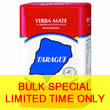Yerba Mate (ilex paraguariensis) is a tea beverage with many health benefits widely consumed in Latin American countries, more specifically in northern Argentina, southern Brazil, Paraguay, and Uruguay. It exclusively grows in these regions due to their unique soil and climate. Mate is traditionally drank out of a gourd using a metal or wooden straw called “bombilla.”. The dry leaves are packed into the gourd and warm/hot water is poured over them. Loose leaf mate is alternatively commercially packed into individual tea bags or mate tea concentrate for use as ingredient in the food or dietary supplement industries. Yerba mate is often termed South America’s green tea.
Yerba Mate has recently gained strong publicity for its health benefits. Scientific literature has reported numerous benefits which include:
-Cholesterol lowering properties amongst numerous heart-protective effects [7]
-Powerful Antioxidant: Yerba Mate has more polyphenols than green tea [3] [5].
-Weight loss aid (Increases fat oxidation, reduces blood cholesterol and triglyceride levels) [1] [3]
-Powerful central nervous system stimulant [3]
-Improves cognition, enhances both short term and long term memory and learning [5]
-Anti-diabetic actions via inhibiting AGE formation which plays a role in diabetic complications [4]
-Stimulates digestion [2]
-Liver protective properties [3]
-Mild Diuretic [2]
Research has validated the majority of the medicinal beliefs towards yerba mate held among the native Guarani Indians for centuries [4]. They used it to enhance immunity, cleanse and detoxify the blood, stimulate the nervous system, maintain youthful hair colour, slow aging, fight fatigue, stimulate the mind, control appetite, relieve debilitating disease, decrease stress, treat insomnia, and so forth.
Each serving of yerba mate contains:
-Vitamins: A, C, E, Thiamine (B1), Riboflavin (B2), Niacin (B3), Pantothenic Acid (B5), B Complex.
-Minerals: Aluminum, Chromium, Calcium, Copper, Iron, Magnesium, Manganese, Nickel, Phosphorus, Potassium, Selenium & Zinc.
-Additional Compounds: Alkaloids, Antioxidants, Carotene, Chlorogenic-acid, Chlorophyll, Inositol, Fatty Acids, Flavonoids, Inositol, Polyphenols, Tannins, Trace Minerals, and 15 Amino Acids. [3] [4] [6] [9]
In 1964 the Pasteur Institute and the Paris Scientific society research on the properties of mate concluded "it is difficult to find a plant in any area of the world equal to mate in nutritional value". Mate was found to contain "practically all of the vitamins necessary to sustain life”! [6]
References
1. Andersen T, Fogh J. Weight loss and delayed gastric emptying following a South American herbal preparation in overweight patients. J Hum Nutr Diet, 14(3):243-50, 2001.
2. Gorzalczany S, Filip R, Alonso MR, Miño J, Ferraro GE, Acevedo C. Choleretic effect and intestinal propulsion of ‘maté’ (Ilex paraguariensis) and its substitutes of adulterants. J. Ethnopharmacol, 75(2–3): 291–94, 2001.
3. Heck, CI, de Mejia, EG. Yerba Mate Tea (Ilex paraguariensis): a comprehensive review on chemistry, health implications, and technological considerations. J Food Sci, 72(9):138-51, 2007.
4. Lunceford, N, l. Ilex paraguariensis extracts inhibit AGE formation more efficiently than green tea. Fitoterapia. 76(5): 419-27, 2005.
5. Matsumoto, RL, Bastos, DH, Mendonça, S, Nunes, VS, Bartchewsky, W, Ribeiro ML, de Oliveira Carvalho, P. Effects of Mate Tea (Ilex paraguariensis) Ingestion on mRNA Expression of Antioxidant Enzymes, Lipid Peroxidation, and Total Antioxidant Status in Healthy Young Women. J Agric Food Chem. 2009.
6. Mowrey.D.B, PH.D. Yerba Mate Unequalled Natural Nutrition in South American Herbs.
Herbal Tonic Therapies, Wings Books, New York, 1996.
7. Prediger.RD, Fernandes.MS, Rial.D, Wopereis.S, Pereira.VS, Bosse.TS, Da Silva.CB, Carradore.RS, Machado.MS, Cechinel-Filho.V, Costa-Campos.L. Effects of acute administration of the hydroalcoholic extract of mate tea leaves (Ilex paraguariensis) in animal models of learning and memory. J Ethnopharmacol, 120(3):465-73, 2008.
8. Schinella, G, Fantinelli, JC, Mosca, SM. Cardioprotective effects of Ilex paraguariensis extract: evidence for a nitric oxide-dependent mechanism. Clin. Nutr. 24(3): 360-6, 2005.
9. Vera Garcia R, Basualdo I, Peralta I, de Herebia M, Caballero S. Minerals content of Paraguayan yerba mate (Ilex paraguariensis, S.H.). Arch Latinoam Nutr., 47 (1):77-80, 1997.
|


